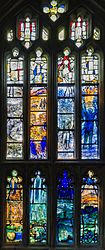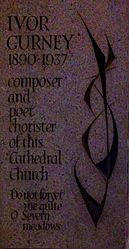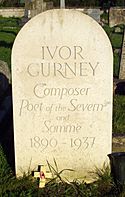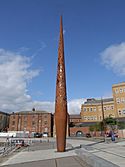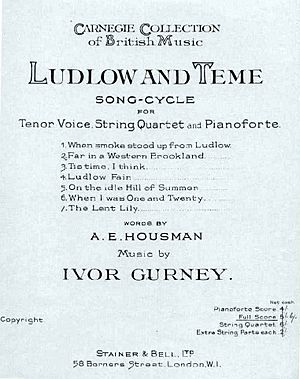Ivor Gurney facts for kids
Quick facts for kids
Ivor Gurney
|
|
|---|---|
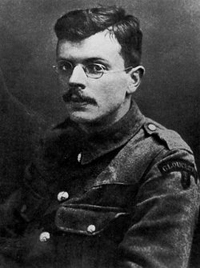
Portrait photograph of Gurney in his Gloucestershire Regimental uniform c. 1915
|
|
| Born |
Ivor Bertie Gurney
28 August 1890 Gloucester, United Kingdom
|
| Died | 26 December 1937 (aged 47) |
| Resting place | St Matthew's Church, Twigworth |
| Monuments |
|
| Nationality | English |
| Education | The King's School, Gloucester |
| Alma mater | Royal College of Music |
| Occupation | Composer, poet, organist, soldier |
Ivor Bertie Gurney (born August 28, 1890 – died December 26, 1937) was an English poet and composer. He was especially known for his songs. Ivor was born and grew up in Gloucester, England.
He faced mental health challenges for much of his life. He spent his last 15 years in hospitals that helped people with their mental health. People who study Gurney's work look at both his poems and his music. Ivor himself felt that music was his most important talent. He once said, "The brighter visions brought music; the fainter verse."
Contents
Ivor Gurney's Life Story
Ivor Gurney was born in Gloucester in 1890. He was the second of four children. His father, David Gurney, was a tailor, and his mother, Florence, was a seamstress.
Ivor showed a talent for music when he was very young. He sang in the choir at Gloucester Cathedral from 1900 to 1906. After that, he became a student of Dr. Herbert Brewer at the cathedral. There, he met another composer, Herbert Howells, who became a close friend for life.
Ivor also became good friends with the poet F. W. Harvey in 1908. Two sisters, Emily and Margaret Hunt, and a reverend named Alfred H. Cheesman, were very important in Ivor's early life. They helped him with his love for music and books.
Ivor started writing music when he was 14. In 1911, he won a special scholarship to study at the Royal College of Music. He learned from Charles Villiers Stanford, a famous teacher. Stanford taught many other well-known composers too. Stanford once told Herbert Howells that Ivor Gurney could be "the biggest of them all," but that he was "unteachable." This meant Ivor had great talent but was hard to teach in a traditional way.
Ivor was a lively person, but he had mood swings that started when he was a teenager. It was hard for him to focus on his studies at college. He had a difficult time with his mental health in 1913. After resting, he seemed to get better and went back to college.
Ivor's studies were stopped by World War I. He joined the army as a private soldier in the Gloucestershire Regiment in February 1915. While fighting, he started writing poetry seriously. He sent his poems to his friend, Marion Scott, who helped him edit and manage his work.
He was writing poems for his first book, Severn and Somme, when he was hurt in the shoulder in April 1917. He got better and went back to the war. He kept working on his book and writing music, including songs like "In Flanders." His book Severn and Somme was published in November 1917.
In September 1917, Ivor was exposed to poison gas. He was sent to a hospital in Edinburgh. There, he met a nurse named Annie Nelson Drummond. They became close, but their relationship later ended.
Ivor Gurney's Mental Health Challenges
In March 1918, Ivor had a very serious mental health struggle. This was partly caused by his relationship with Annie Drummond ending. He was hospitalized at Brancepeth Castle. Even there, he wrote several songs.
Ivor slowly got back some of his emotional stability. In October, he was honorably discharged from the army. People at the time sometimes called his mental health issues "deferred" shell shock. This was a term used for mental health problems caused by the war.
After the war, Ivor seemed to do well. Many thought he was one of the most promising artists of his time. However, his mental struggles continued to get worse. He briefly studied with Ralph Vaughan Williams at the Royal College of Music. But he left before finishing his studies.
His second book of poetry, War's Embers, came out in May 1919. He kept writing music, including many songs and pieces for instruments. His music was being performed and published. But by 1922, his condition had gotten so bad that his family decided he needed special care.
Ivor spent the last 15 years of his life in hospitals that helped people with their mental health. He was first at Barnwood House in Gloucester, then at the City of London Mental Hospital. There, doctors said he had "delusional insanity." This meant he sometimes believed things that weren't real. For example, during this time, he seemed to believe he was William Shakespeare himself.
He wrote a lot during these years in the hospital. He created about eight collections of poems. He also wrote two plays in the style of Shakespeare. He continued to compose music, but not as much. Many of his musical works have never been published or recorded. By the 1930s, Ivor wrote very little.
Death and Remembering Ivor Gurney
Ivor Gurney died from tuberculosis on December 26, 1937, at age 47. He was still a patient at the City of London Mental Hospital. He was buried in Twigworth, near Gloucester. His godfather, Rev. Alfred Cheesman, led the service. His gravestone says he was "a lover and maker of beauty."
Marion Scott, his friend, saved Ivor's writings and letters. She worked with composer Gerald Finzi to make sure his work would not be forgotten.
On November 11, 1985, Ivor Gurney was one of 16 Great War Poets honored in Westminster Abbey's Poet's Corner. A special stone was placed there to remember them. The words on the stone were written by another war poet, Wilfred Owen: "My subject is War, and the pity of War. The Poetry is in the pity."
In 2000, a stained-glass window was put in St Mary de Lode Church, Gloucester to honor Ivor Gurney. In 2009, a memorial to Ivor was built in Sint-Juliaan, Belgium. This is near where he was exposed to mustard gas in 1917.
A sculpture called The Candle was revealed in 2011 in Victoria Dock, Gloucester Docks. It has lines from Gurney's poem "Requiem" carved around its base. There is also a blue plaque memorial to Ivor Gurney in Eastgate Street, Gloucester.
In April 2014, a TV show called The Poet Who Loved the War was shown on BBC Four. It talked about how World War I helped Ivor Gurney through his periods of sadness. It also showed how he became one of the most important poets of the war.
Ivor Gurney's Works
Music and Poems
Ivor Gurney wrote hundreds of poems and over 300 songs. He only set a few of his own poems to music. One of the most famous is "Severn Meadows." His Five Elizabethan Songs were written when he was a student and published in 1920.
He also created song cycles like Ludlow and Teme (published 1923) and The Western Playland (published 1926). These used poems by A. E. Housman. Friends like Gerald Finzi and Marion Scott helped prepare these for publication.
Gurney also set many poems by other writers to music. These included poems by Edward Thomas, W. H. Davies, and Rupert Brooke.
Some people say Gurney's music has a strong, emotional style, similar to composers like Schubert and Schumann. He liked to set dark, story-telling songs to music.
Ivor also wrote music for instruments. He wrote five pieces for piano called Five Preludes, published in 1921. He also wrote four piano sonatas and about 20 string quartets, though most of these are now lost.
War Poet and Local Poet
Ivor Gurney is known as one of the great World War I poets. Like other poets of that time, he often compared the terrible things of the war with the beauty of his home in England.
Gurney wrote about the war from a soldier's point of view, not an officer's. His poems offered a complex, sometimes funny, and not always heroic look at life on the Western Front. He didn't make big statements for or against war. Instead, he shared his own personal experiences.
His poems often highlighted moments of relief and small joys in trench life. These included friendships, letters from home, singing, and simple foods. He wanted to show "the protest of the physical against the exalted spiritual." This meant he focused on the small, real details of life rather than grand ideas.
At the same time, Gurney was very connected to his home in Gloucester. This area stayed important to him, both during the war and later in the hospital. In his first book, he wrote about "my county, Gloucester, that whether I live or die stays always with me."
Collections of His Works
Many of Ivor Gurney's poems and letters have been collected and published. Some important collections include:
- Severn & Somme, 1917
- War's Embers, 1919
- Collected Poems, edited by P. J. Kavanagh, first published in 1982
- War Letters, edited by R.K.R. Thornton, 1983
Selected Poems to Explore
Here are some of Ivor Gurney's poems that can help you understand his work:
- "Strange Hells" – About how war affects soldiers' minds.
- "The Ballad of Three Spectres" – A soldier's vision.
- "Maisemore" – A soldier thinking about his home.
- "The Estaminet" – About friendship among soldiers.
- "Purple and Black" – About the meaning of death.
- "To the Poet before Battle" – A soldier poet getting ready to fight.
- "To His Love" – A soldier writing to a dead friend's loved one.
- "The Silent One" – A story about a scary moment during a battle.
See also
 | Emma Amos |
 | Edward Mitchell Bannister |
 | Larry D. Alexander |
 | Ernie Barnes |


